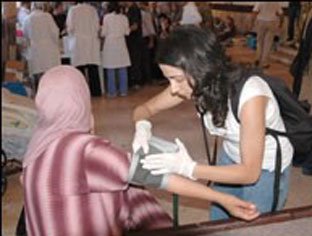http://blogs.abcnews.com/theblotter/2006/07/beirut_er_times.html

July 31, 2006 7:10 PM
Lara Setrakian Reports:
There is not much time left before the lights will go out at the American University of Beirut Medical Center. Oil tankers ready to deliver the much-needed fuel are standing by in nearby waters, but they are being kept out by Israel's blockade.
The hospital has only enough oil to fuel their generators for a maximum of 20 days, or as little as seven days if the state cuts off the little power it now provides, according to Dr. Nadim Cortas, Dean of the medical program.
Israel and others may fear the fuel those tankers carry would go to Hezbollah fighters, used for their trucks and artillery. But Cortas argues this point.
"We see no reason why there should be a blockade on fuel delivery. It could be conditional, only going to hospitals, and it can be monitored. It wouldn't go straight to [Hezbollah] warriors. The blockade…has no benefit to Israel except to inflict more suffering on the civilian population."
What he and other doctors are hoping is that Israel will let the oil through, with either the Lebanese government or third-party agencies, like the Red Cross, making sure it gets to the hospital.
American University Medical Center is Lebanon's biggest and most important hospital. But with the electric grid damaged and the current shortage of fuel, the lights could very well go out for the healthcare provider.
Without the Medical Center, more refugees would likely get their healthcare from Hezbollah's grassroots aid efforts. Hezbollah currently hands out food and care in many of the makeshift shelters around Beirut housing refugees from the south of Lebanon and southern suburbs of Beirut.
If power runs out, it's unclear what would happen to the dozens of refugees and war injured at the hospital, not to mention the routine patients waiting to give birth or receive organ transplants.
"[The Hospital] has received dozens of injured and will receive transfers of dozens more from the south," Dr. Cortas says. "And we've said yes to all of them. Payment is no issue."

No comments:
Post a Comment